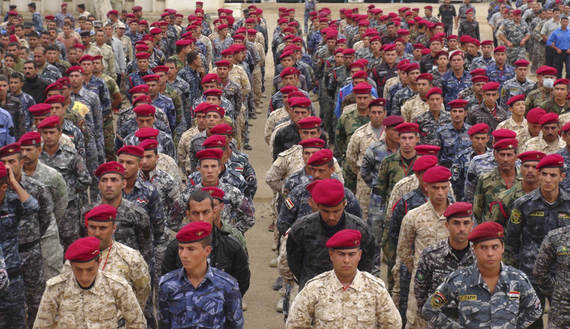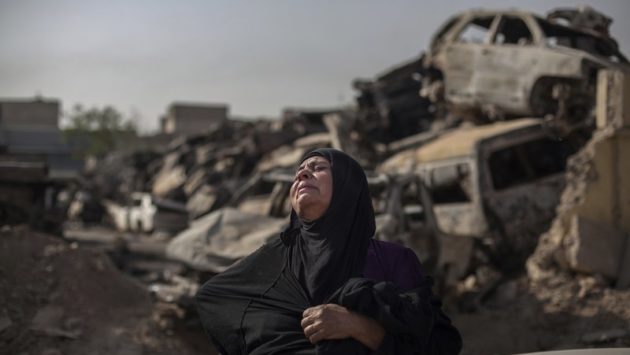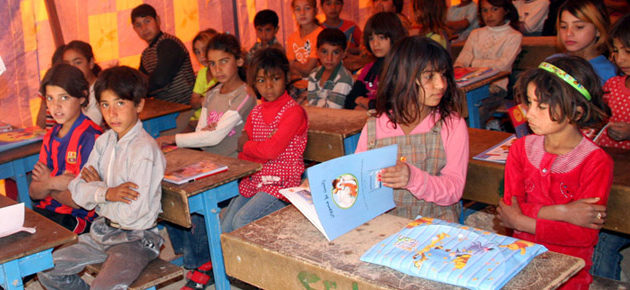Who Represents Iraqi Sunnis?
Mushreq Abbas – al-monitor

Who represents Iraq’s Sunnis? Iraqis have not answered this incredibly sensitive question. The danger of being unable to clearly answer this question is directly related to the war on the Islamic State (IS), as well as the efforts of the Iraqi government, US troops and the international community to support the fighters tasked with liberating Sunni areas from IS control.
In late October 2014, US Gen. Martin Dempsey, chairman of the Joint Chiefs of Staff, said his country seeks to expand its training mission in Iraq to include Arab tribes in Anbar province. On Nov. 11, 2014, Iraqi Speaker of Parliament Salim al-Jabouri affirmed that the armament of the tribes is imminent.
Arming the tribes is equivalent to the formation of a national guard consisting of local fighters. The Iraqi parliament has not yet passed this project, despite its being part of a declared government program. Sunni politicians back the idea, even demanding that its implementation be rushed. Yet, some Shiite politicians, including Vice President Nouri al-Maliki, question the armament of tribes. Paradoxically, when Maliki was prime minister, he announced on Jan. 15, 2014, a few days after the occupation of Fallujah by IS, his intention to arm the tribes of Mosul. Mosul had not yet been overrun by IS.
Ideas like arming tribes, forming a national guard and establishing a Sunni region vary in how they are defined, even within Sunni circles. Officials at the regional and international levels also differ in their positions regarding these ideas.
Sunni representation in Iraq is in a deep-rooted crisis that is connected to Sunnis leading the state for many decades. Following 2003, the conditions were favorable for the emergence of Shiite representation, which consisted of Islamist parties and religious authorities, and for the emergence of Kurdish representation in the form of nationalist parties and authorities. Both Kurds and Shiites got their piece of the cake early, leaving the Sunnis in search of representatives.
It cannot be said that the current Sunni political class represents the Sunni people based on electoral results. In actuality, another less visible class represents the Sunni politicians who have influence. They are either associated with the former regime, the Baath Party, religious orientations or linked to armed groups that fought the US forces, or those who, under Maliki rule, were held on charges of terrorism.
The nature and traditions of the Sunni sect prevent the emergence of traditional religious authorities that enjoy consensus or a decisive influence similar to that of Shiite religious authorities. Moreover, the nationalist side of the Sunni memory is linked to the Baath Party, which was excluded from the political scene after 2003.
Even the “tribes,” which are said to be representatives of the Sunnis, have no real credibility on the ground. They are sharply divided and have been engaged in internal conflict over representation. Political experiments throughout the 20th century have used this tribal conflict as a political tool.
The Maliki government, from 2006 to 2014, dealt with Sunni representation from a selective perspective, endorsing figures who were closer aligned with its policies, even if they did not meet the requirements of representations. Maliki’s government also excluded those who opposed its policies, even if they did meet the requirements.
Earlier this year, Maliki provided tribal leaders with financial support and arms, considering them to be politicians, in the hope of turning them into representatives of the Sunnis. They included Ahmed Abu Risha, who announced last April that he is on the verge of liberating Fallujah from IS. Yet, the opposite has happened.
Many solutions were proposed to solve the Sunni situation after 2003, mainly the division of Iraq based on Sunni, Shiite and Kurdish identities. But this idea was not convenient for Iraqi Sunnis, who found that the division would turn them into a minority. This has pushed them to repeatedly boycott the elections and not recognize politicians in parliament as their representatives.
The Sunni support for Ayad Allawi, a secular Shiite politician, as their representative in 2010 was an example of an attempt to rebel against the tripartite partition, which prompted Iraq’s Shiites to overcome their differences to preserve the rule within the national alliance, which represents them politically.
Maliki’s rule did not help the Sunnis determine which party represents them; he excluded political figures who were eligible to form the nucleus of a Sunni representation, such as former Finance Minister Rafi al-Issawi. Dozens of political, tribal and religious figures who were subject to accusations and charges of supporting terrorism were not eligible to speak on behalf of the Sunnis. Yet, a cleric such as Sheikh Abdul Malik al-Saadi introduced himself after the 2013 demonstrations as an agreed-upon Sunni religious authority.
The Maliki government did not invest in the rare Sunni consensus, which could have brought about real reforms to reassure the Sunnis in the long term.
The Saadi phase has faded with the rise of IS and its control over entire Sunni cities. On Oct. 31, Saadi announced that he has stopped issuing fatwas because no one is listening to him. This is proof that the emergence of clear Sunni representatives in Iraq will continue to be an unresolved matter, and that the Sunni mood will always change in terms of its representatives.
The sensitivity of the Sunni issue is first linked to the future of the rule in Iraq, before it is linked with the expulsion of IS from Sunni cities. If Iraq is able to overcome the tripartite partition in the future and move toward becoming a national entity — which is becoming increasingly unlikely day after day — then the current Sunni situation will be able to adapt to an Iraq that is rebuilt based on this formula.
Nevertheless, if Iraq’s state project heads toward partition and ethnic and sectarian differentiation, then local, regional and international political parties are tasked with supporting strong and true Sunni representation in Iraq that will have to force explicit partnerships with other components.



